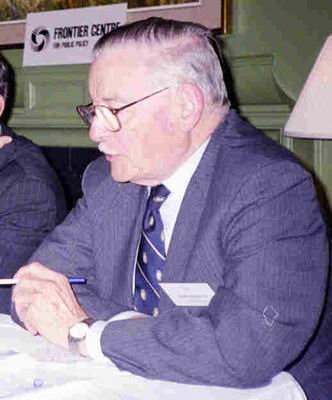One of our era’s most important economists has passed away. James Buchanan was known as one of the founders of the Public Choice school of economics. Buchanan, who won a Nobel Prize in economics for his research in 1986, referred to “public choice” as the theory of “politics without romance.” More basically, it was about the economics of politics – and how organized special interests, for example, dominate policy making. It holds that bureaucrats and politicians, may talk about the public interest but they are like normal people and will advance their own interests in the policy making process. This means expanding power and budgets and public spending.
The famous so-called “Iron Triangle” is classic public choice theory where the 3 points of the triangle cooperate to advance their own interests almost always at great cost to the general public or better, the unorganized, dispersed tax payer. The politician buys votes to be elected by proposing some national program, the bureaucrats get more prestige by managing an ever bigger public workforce, and some special interest – typically a public sector union or a private industry association gets a program that concentrates benefits and spending on themselves. Meanwhile the general public gets dinged a small amount (spread over the population) which eventually add up to serious coin.
Much of dysfunctional Canadian public policy relates well to James Buchanan’s Public Choice thinking. Try a healthcare system run for the unions and providers, not the patients. In the private sector we have the classic supply management cartels in dairy, egg and poultry and the taxi monopolies which rip everybody off with unecessarily high prices.
My first contact with him was in 1986 when I managed to swing an invitation from someone in the ideas community to his Nobel acceptance speech at the Mayflower Hotel in Washington DC. His thinking and writing were clear. For his critics, they were almost too basic and there was grumbling that his work did not merit the Nobel. I, along with many others, disagreed. It turns out his work explains so much these days.
Frontier had more contacts with James Buchanan over several years. We made waves when my interview with him in 2001 revealed his thoughts on Canada’s dysfunctional equalization program. Ironically, as a young academic he had written up the case for a limited equalization scheme to discourage excessive immigration to prospering areas. In his vision, equalization could be justified with investments in education and infrastructure to build up disadvantaged areas. More significantly he suggested government could make limited transfers to individuals by lowering tax rates in affected areas. The bombshell in the interview was his response to my question about transferring to governments in disadvantaged areas. It was a bad idea, he said, it simply would end up expanding the recipient governments payroll and bureaucracy.
Of course, this is exactly what has happened in Canada’s equalization program where transfers now prop up huge administrative infrastructures in all the so-called “have not” provinces like Manitoba and Quebec.
I am generally positive about the Harper Government in Ottawa but the biggest area where its fallen down on policy is the failure to heed Buchanan’s observations on transfers to governments. It mulishly and naively continues to boast that it is not cutting (reforming) transfers. Some day it will recognize, at what huge cost the program is increasingly imposing on Canada’s competitiveness and prosperity.
The moribund governments to be found in places like Manitoba and Quebec would have to reform policy pronto with smarter equalization of the type proposed by James Buchanan, not Ottawa’s well intended but ultimately damaging inter-governmental tranfer payment gravy train which has been captured, as predicted, by bloated public payrolls.
Anyways James Buchanan’s ideas will remain with us to offer policy reformers everywhere a more prosperous way forward.
Watch short video on James Buchanan’s achievements.



